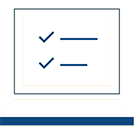In this program grouping, students should be able to meet specific technical standards, which are the essential skills and abilities needed to be successful in a program, with or without reasonable accommodation. It is important to review and understand these standards before applying to the program.
This information should be reviewed prior to applying to the program.
Reasonable accommodations for persons with disabilities will be made to ensure access to academic programs, activities, services, and employment in accordance with Section 504 and 508 of the Rehabilitation Act of 1973 and Title II of the Americans with Disabilities Act of 1990, as amended. If accommodations are needed, contact the campus Accommodations Specialist or the Northwood Tech Affirmative Action/Equal Opportunity Officer, at 715-645-7042, TTY 711, 30 days in advance of needed assistance. Services available are documented on the Northwood Tech Accommodations webpage:
Accommodation Services | Northwood Technical College.
For more information, please see Administrative Procedure J-111A Reasonable Accommodation for Student.
Area
Physical Skills
Standard
Students must be able to apply knowledge and experience through demonstrating competency, quality and productivity standards in job responsibilities as outlined in the course competencies and program outcomes.
Students must be able to utilize computers and required software to access, abstract, manage, interpret, and analyze information and data.
Students must have sufficient gross and fine motor skills to perform tasks in a timely, safe and effective manner.
Students must have sufficient endurance and coordination, with or without accommodations, to perform tasks and emergency procedures.
Examples (Not Inclusive)
- Review online clinical documentation.
- Query databases, data mining, and preparation of reports interpreting data.
- Apply organizational policies and procedures.
Sensory Skills
Students must have sufficient auditory ability, visual ability, sense of smell and tactile ability, with or without accommodations.
- Understand patient requests and needs.
- Identify dangerous objects and client situations within the client room.
- Recognize signs of potential substance abuse, intoxication, overdoses, and medication/drug interactions.
- Observe changes in behavior, emotional state, physical characteristics, level of consciousness, and cognitive functioning.
Communication Skills
Students must be able to listen and respond to others in a nonjudgmental, respectful manner.
Students must be able to exhibit behaviors that promote positive interactions with clients, families and other professionals.
Students will be able to observe and recognize non-verbal behavior.
Students should demonstrate emotional stability.
Students should demonstrate interpersonal skills.
Students must have effective verbal communication, nonverbal communication, written communication, and electronic communication, with or without accommodations.
- Ability to interact and support clients during times of stress and emotional upset while remaining in a reasonable state of calm.
- Ability to focus attention on client needs despite interruptions and multiple demands.
- Ability to show respect for diversity in culture, religion, sexual orientation, marital status, socio-economics status and abilities / disabilities.
- Discuss and ask questions regarding documentation with professionals and clients.
- Work independently and in a team.
- Convey information in a clear, professional, and timely manner.
- Listen and respond to others in an accepting and respectful manner.
Safety Skills
Students must apply knowledge, skills and experience to provide a safe work environment.
- Adhere to safety/emergency protocols, including prevention and appropriate intervention in crisis situations.
- Identify and resolve unsafe situations Be familiar with and follow emergency procedures.
Critical Thinking Skills
Students must have sufficient critical thinking and problem-solving skills to assess, plan, reason, analyze and synthesize data in a timely manner.
Students should demonstrate the ability to problem solve and make decisions.
Students should demonstrate the ability to apply knowledge, skills and experience.
- Apply knowledge and skills learned in the classroom to a professional setting.
- Demonstrate positive interpersonal skills.
- Demonstrate impulse control and professional level of maturity.
- Maintain confidentiality and appropriate boundaries in relationships with clients and peers.
- Handle demanding and stressful situations.
- Recognize the need to consult with colleagues and supervisors.
- Ability to problem-solve complex situations.
Professionalism
Students should demonstrate ability to adapt to changing situations and emergency conditions while maintaining emotional maturity.
Students must be able to when effectively under stress; utilize healthy stress management techniques.
Students must demonstrate integrity, moral reasoning, ethical behaviors and concern for others. They must acquire interpersonal skills for professional interactions with diverse individuals and communities. They must work cooperatively with professional teams, adapt to changing environments, and function effectively under stress. Students must keep information confidential.
Students should demonstrate ability to accept responsibility for own health and self-care practices.
Students should demonstrate appropriate behavior to establish effective relationships with clients, families, and staff, with varied socioeconomic, emotional, cultural and intellectual backgrounds.
Students must show respect for diverse populations.
- Exhibit positive interpersonal skills in all interactions.
- Maintain confidentiality.
- Demonstrate ability to work as a team member.
- Adhere to attendance, dress code, and personal hygiene policies or protocol.
- Respond to challenging situations while maintaining composure and professionalism.
- Exhibit consistent and on-time attendance as scheduled.
- Work cooperatively with intra and inter professional teams.
- Display integrity, honesty, respect, reliability, and accountability.
- Accept and utilize construction feedback to enhance personal and professional growth.
- Work with people with varied backgrounds including but not limited to race, ethnicity, gender identify, and socioeconomic status.
- Comply with legal and ethical standards.
- Maintain appropriate boundaries.
- Adapt to change in directives as priorities and goals shift.
Northwood Technical College does not discriminate on the basis of race, color, national origin, sex, disability, or age in its programs and activities. The following person has been designated to manage inquiries regarding the non-discrimination policies: Amanda Gohde, Vice President, Talent & Culture, 1900 College Drive, Rice Lake WI 54868; Amanda.Gohde@NorthwoodTech.edu, phone: 715-645-7042.

